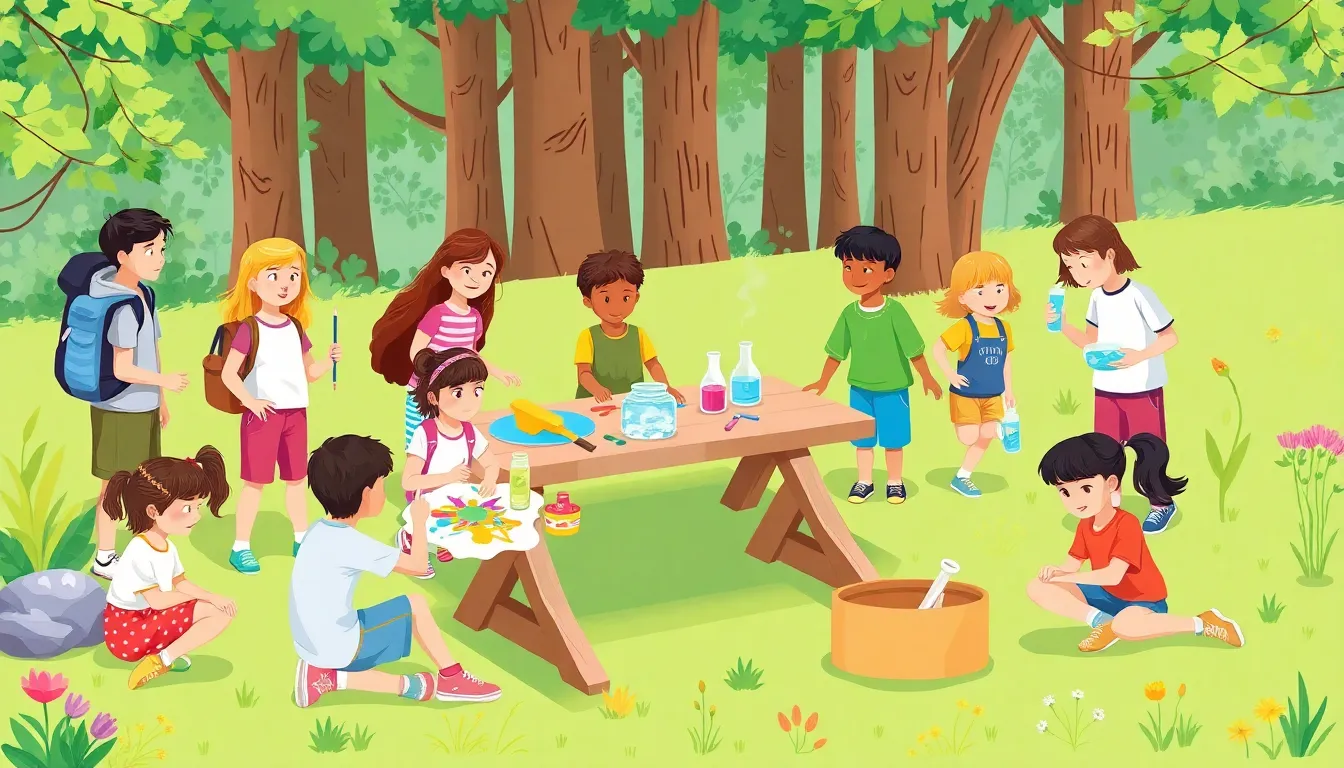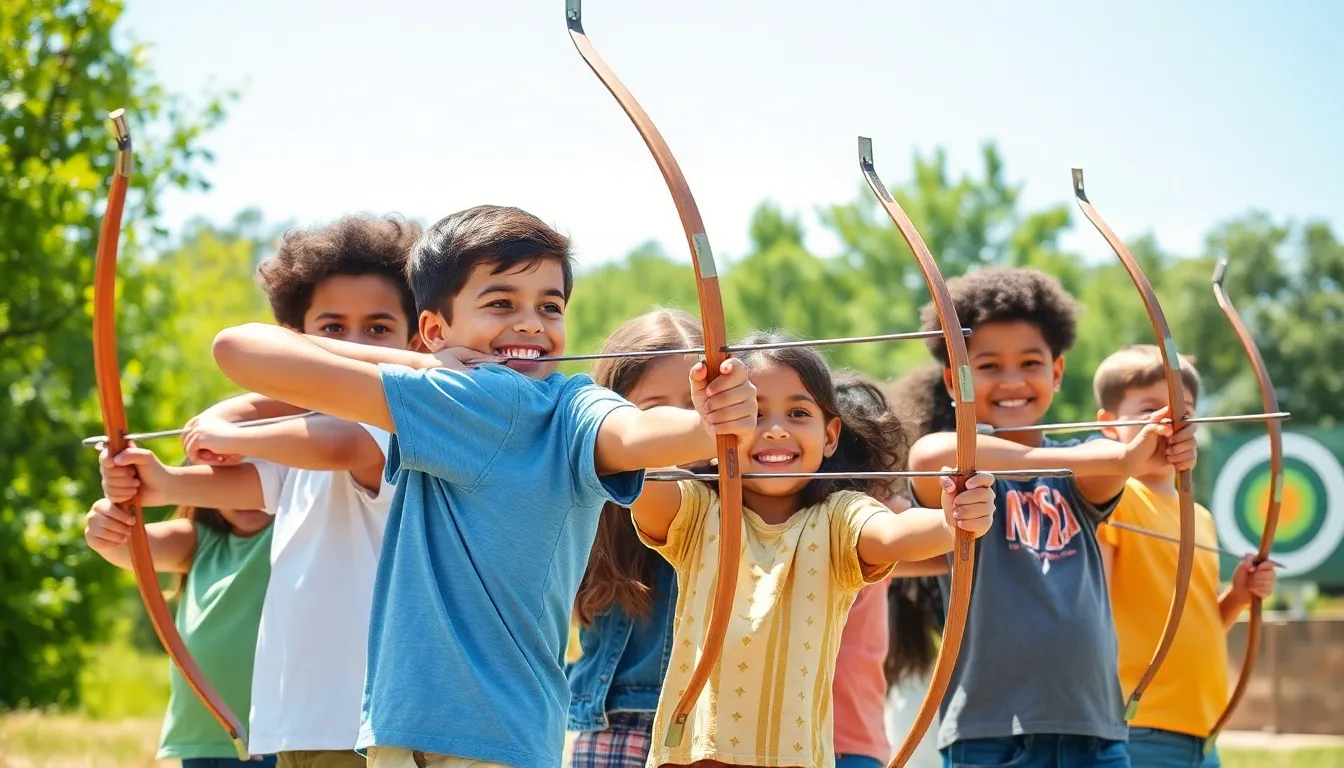As summer approaches, the age-old question arises: what to do with the kids? Enter summer camp programs—the magical land where kids trade screens for sun, laughter, and a little mud. Imagine your child conquering the great outdoors, mastering archery, or perfecting the art of friendship while you sip your coffee in peace. It’s a win-win!
Table of Contents
ToggleOverview of Summer Camp Programs
Summer camp programs offer children unique opportunities to engage in enjoyable activities and develop essential skills. These programs create a vibrant atmosphere for kids to explore new interests and form lasting friendships.
Types of Summer Camp Programs
Various types of summer camp programs exist to cater to different interests. Outdoor adventure camps focus on activities like hiking, kayaking, and rock climbing. Arts and crafts camps emphasize creativity through painting, sculpting, and music. Specialty camps target specific skills, such as sports or technology, allowing children to dive deeper into their passions. Day camps typically run during daytime hours, while overnight camps provide immersive experiences over several days or weeks. Families can choose from a wide array of options to best fit their children’s needs.
Benefits of Summer Camp Programs
Summer camp programs deliver numerous benefits for children. Social skills improve as kids interact with peers through cooperative activities and teamwork. Confidence builds as they try new things and face challenges. Physical health receives a boost from outdoor activities that promote exercise and a love for nature. Camps also encourage independence, as children learn to make choices and manage daily tasks away from home. Overall, summer camps foster well-rounded development, making them a valuable experience for youth.
Popular Summer Camp Programs

Various summer camp programs cater to children’s diverse interests, promoting skill development and social interaction. Each program type offers unique experiences.
Outdoor Adventure Camps
Outdoor adventure camps focus on physical activities such as hiking, rock climbing, and kayaking. Children develop teamwork and resilience in challenging environments. Skills like navigation and survival techniques enhance campers’ appreciation for nature. Many outdoor camps prioritize safety while fostering independence and self-confidence. Campers often build friendships through shared adventures and experiences in the great outdoors.
Arts and Crafts Camps
Arts and crafts camps encourage creativity through various artistic activities. Children explore painting, sculpting, and crafting while expressing their individuality. Programs often feature guided projects, allowing campers to develop artistic skills. Collaboration frequently occurs in group projects, enhancing social interaction. Exposure to different art mediums helps campers discover new passions and talents.
Science and Technology Camps
Science and technology camps immerse children in hands-on learning experiences. Campers engage in experiments and coding workshops, developing critical thinking skills. Programs often introduce subjects like robotics, chemistry, and engineering. Interactive projects stimulate curiosity and innovation, guiding children toward STEM fields. Networking with peers who share similar interests enhances the overall camp experience.
Choosing the Right Summer Camp Program
Selecting a suitable summer camp program involves careful consideration of various factors that match children’s needs and preferences.
Age Appropriateness
Age-appropriate camps cater to different developmental stages. Programs designed for younger children focus on play and social skills, while older campers may benefit from challenges that promote independence. Camps often clearly outline age requirements in their descriptions. Ensuring that children engage with peers of similar ages enhances their social interaction and enjoyment. Parents often find that matching the camp’s structure to their child’s age fosters a supportive and nurturing environment.
Interests and Activities
Understanding children’s interests is crucial for finding the right camp. Programs vary widely, from outdoor adventure camps promoting physical activities to arts and crafts camps encouraging creativity. Many children thrive in environments that align with their hobbies, whether exploring nature or engaging in artistic pursuits. Specialty camps focused on specific skills, such as technology and science, can also provide targeted learning experiences. Parents should assess their child’s passions to ensure a fulfilling and engaging summer experience.
Location and Accessibility
Location plays a significant role in choosing a summer camp. Camps situated nearby can simplify logistics for parents while minimizing travel time for kids. Consideration of accessibility features is equally important for children with special needs. Many families prefer day camps since they allow children to return home each evening, keeping routines intact. Evaluating transportation options and the camp’s accessibility can enhance convenience and overall satisfaction. Selecting a camp within a reasonable distance helps create a stress-free experience for the entire family.
Tips for Parents
Preparing a child for camp involves addressing both excitement and concerns. Discussing the camp’s schedule helps children understand what to expect daily. Encourage children to express their feelings, whether it’s excitement, nerves, or curiosity. Familiarizing them with camp activities can build enthusiasm. Engaging in preparatory visits, if possible, allows children to explore the environment, making them feel more comfortable.
What to pack for summer camp plays a crucial role in ensuring a smooth experience. Parents should include essentials like clothing suited for various weather conditions, toiletries, and personal items. Additionally, snacks and a reusable water bottle are important for hydration and energy. Labeling belongings helps prevent mix-ups with other campers’ gear. Lastly, including a few comfort items, such as a favorite stuffed animal or book, can ease homesickness.
Communication during camp enhances the connection between parents and children. Establishing a routine for check-in calls reinforces support and familiarity. Writing letters can also create excitement, allowing children to share experiences through words. It’s essential for parents to maintain a positive tone, encouraging children to embrace their adventures. Using camp staff as a communication bridge fosters reassurance and provides insight into children’s daily activities.
Summer camp programs offer children invaluable experiences that extend beyond just fun. They foster independence and social skills while allowing kids to explore their interests in a supportive environment. With a variety of camps available there’s something for every child whether they’re drawn to outdoor adventures or creative pursuits.
Parents can feel confident knowing these programs not only provide engaging activities but also promote personal growth. By carefully considering factors like age appropriateness and location families can find the perfect camp fit. Preparing children for camp ensures a smoother transition and enhances their overall experience. Embracing the joys of summer camp can lead to lasting memories and friendships that enrich children’s lives for years to come.



